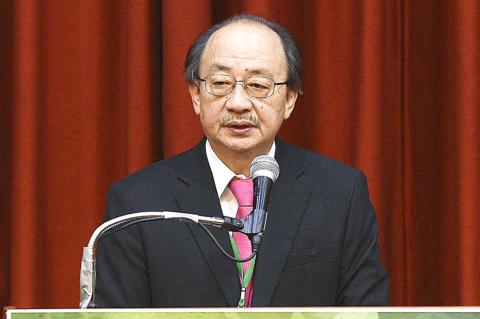The Democratic Progressive Party (DPP) caucus yesterday said it would redraft a proposed bill on monitoring cross-strait agreements in line with the Republic of China (ROC) Constitution, meaning the terms “Taiwan” and “China” would be changed to “Taiwan Area” and “Mainland Area.”
“We will submit an official caucus proposal for a bill to monitor cross-strait negotiations and agreements by the end of the month,” DPP caucus whip Ker Chien-ming (柯建銘) said after a meeting to prepare DPP lawmakers for the legislative session scheduled to begin today. “As for the name of the bill, we will refer to the ROC constitutional framework; we will not use the names we used in the past.”
Ker said that as the new bill is to conform with the ROC constitutional framework, not only would its title be changed, but some of its content would also be adjusted.

Photo: Chen Chih-chu, Taipei Times
The original bill drafted by the DPP in the previous legislature was called “Regulations for Handling Agreements between Taiwan and China,” with a preamble stating that the law was meant to regulate issues concerning the signing of agreements between Taiwan and China.
However, since the caucus has decided to follow the ROC constitutional framework, the terms “Taiwan” and “China” would be changed to “Taiwan Area” and “Mainland Area” in accordance with the Constitution and relevant laws on cross-strait issues.
New Power Party executive chairman Huang Kuo-chang (黃國昌) said Ker’s comments were unclear and that the DPP had an obligation to explain if and why its position had changed.
The “framework of the Constitution of the Republic of China” can be interpreted in different ways, depending on which part of the Constitution is referenced, Huang said.
He said that if the “framework” refers to the sovereignty invested by the Constitution in Taiwanese, it would not necessarily represent a denial of the “two states” dictum (兩國論), which was premised on the legal theory that the nation has already achieved de facto independence as a result of constitutional amendments passed during the democratization process.
Any framework that relegates Taiwan to the status of an “area” of the Republic of China and includes a Chinese “mainland” would be “unacceptable,” he said.
“We have invested a lot of energy into constructing a Taiwanese national consciousness and most Taiwanese have already accepted the fact that China and Taiwan are different countries — do you really want to go back 20 years and say that we are really ‘one country with two areas’?” Huang said.
The “one country with two areas” stance goes against common sense, while the 11th amendment which enshrined it into the Constitution was illegitimate because it had been passed by “lifelong” lawmakers who held their seats from 1949 until 1992, he said.

A magnitude 7.0 earthquake struck off Yilan at 11:05pm yesterday, the Central Weather Administration (CWA) said. The epicenter was located at sea, about 32.3km east of Yilan County Hall, at a depth of 72.8km, CWA data showed There were no immediate reports of damage. The intensity of the quake, which gauges the actual effect of a seismic event, measured 4 in Yilan County area on Taiwan’s seven-tier intensity scale, the data showed. It measured 4 in other parts of eastern, northern and central Taiwan as well as Tainan, and 3 in Kaohsiung and Pingtung County, and 2 in Lienchiang and Penghu counties and 1

FOREIGN INTERFERENCE: Beijing would likely intensify public opinion warfare in next year’s local elections to prevent Lai from getting re-elected, the ‘Yomiuri Shimbun’ said Internal documents from a Chinese artificial intelligence (AI) company indicated that China has been using the technology to intervene in foreign elections, including propaganda targeting Taiwan’s local elections next year and presidential elections in 2028, a Japanese newspaper reported yesterday. The Institute of National Security of Vanderbilt University obtained nearly 400 pages of documents from GoLaxy, a company with ties to the Chinese government, and found evidence that it had apparently deployed sophisticated, AI-driven propaganda campaigns in Hong Kong and Taiwan to shape public opinion, the Yomiuri Shimbun reported. GoLaxy provides insights, situation analysis and public opinion-shaping technology by conducting network surveillance

‘POLITICAL GAME’: DPP lawmakers said the motion would not meet the legislative threshold needed, and accused the KMT and the TPP of trivializing the Constitution The Legislative Yuan yesterday approved a motion to initiate impeachment proceedings against President William Lai (賴清德), saying he had undermined Taiwan’s constitutional order and democracy. The motion was approved 61-50 by lawmakers from the main opposition Chinese Nationalist Party (KMT) and the smaller Taiwan People’s Party (TPP), who together hold a legislative majority. Under the motion, a roll call vote for impeachment would be held on May 19 next year, after various hearings are held and Lai is given the chance to defend himself. The move came after Lai on Monday last week did not promulgate an amendment passed by the legislature that

Taiwan is gearing up to celebrate the New Year at events across the country, headlined by the annual countdown and Taipei 101 fireworks display at midnight. Many of the events are to be livesteamed online. See below for lineups and links: Taipei Taipei’s New Year’s Party 2026 is to begin at 7pm and run until 1am, with the theme “Sailing to the Future.” South Korean girl group KARA is headlining the concert at Taipei City Hall Plaza, with additional performances by Amber An (安心亞), Nick Chou (周湯豪), hip-hop trio Nine One One (玖壹壹), Bii (畢書盡), girl group Genblue (幻藍小熊) and more. The festivities are to